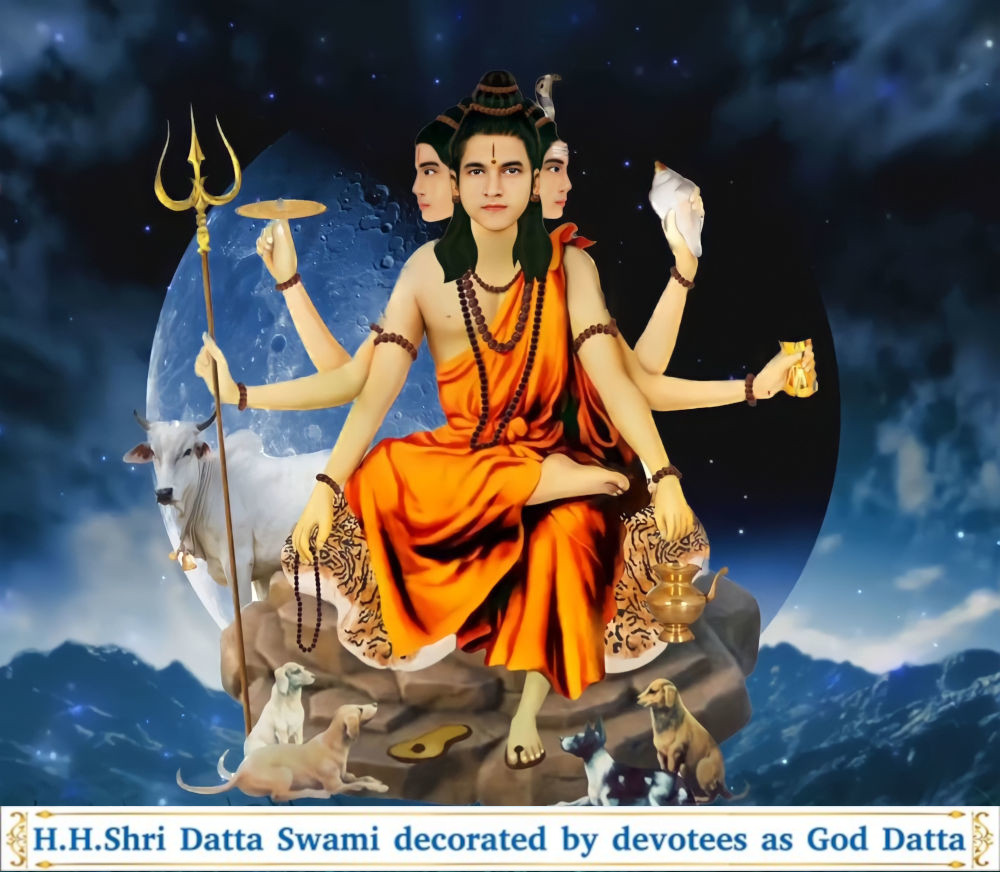
16 Jul 2023
Dattamata Viṃśatiḥ: Verse 7
(Philosophy of God Datta in twenty verses)

अहं यदि स पूर्वतः कथमयं विभूतेः कणो
न दृष्ट इति पृच्छतो मलविशुद्धये भक्तिवाक् ।
क्रियात्मक समाप्ति भाषित गुरुत्रयात्तान्वयात्
त्वयैव सकलं मतं परमते हि ते सेविनोः ।। 7
Ahaṃ yadi sa pūrvataḥ kathamayaṃ vibhūteḥ kaṇo
Na dṛṣṭa iti pṛcchato malaviśuddhaye bhaktivāk ।
Kriyātmaka samāpti bhāita Gurutrayāttānvayāt
Tvayaiva sakalaṃ mataṃ paramate hi te sevinoḥ ।। 7
[The atheist converted to theist by Shankara asked “If I am God already, why I am unable to do even a small miracle?” Shankara replied “Your ignorance of truth and the new impression (Vikṣepa) that you are tiny soul are very much solidified (Mala) due to a very long time through innumerable previous births. Hence, you have to devote to God for a long time to remove the new impression and gain the original truth that you are God”. Like this, the atheist not only became theist but also became a devotee to God. Shankara emphasized practical devotion also after the theoretical devotion. Like this, Shankara established the whole concept from beginning to end. Later on, Ramanuja emphasized theoretical devotion because theory is the mother of practice. At the end, Madhva came and stressed on practical devotion (service and sacrifice). In this way, there is no contradiction among the three divine preachers in their philosophies. Shankara as incarnation of God Shiva stressed on this knowledge giving the complete concept. Ramanuja (Ādiśeṣa), the servant of God came and stressed on theoretical devotion. Madhva, the incarnation (or son) of deity Vāyu stressed on practical devotion. In this way, there is a good correlation between the philosophies of the three divine preachers. Shankara is God and Ādiśeṣa and Vāyu are the servants of God and therefore, supported the philosophy of Shankara only in due course (this is like after a lecture given by a professor; his research scholars come and revise the subject of the lecture. In this verse, Ramanuja and Madhva are not insulted because the followers of Ramanuja themselves say that Ramanuja is the incarnation of Ādiśeṣa and the followers of Madhva themselves say that Madhva is incarnation or son of deity Vāyū. In fact, we say that Ramanuja is the incarnation of God Vishnu and Madhva is the incarnation of God Brahma. Therefore, the followers of Ramanuja and Madhva need not criticize us that we have referred to Ādiśeṣa and Vāyu as the servants of God).]
★ ★ ★ ★ ★
Also Read
Related Articles
Message On Shankara And Ramanuja Jayantis
Posted on: 25/04/2023Is There A Strong Connection Between Madhvacharya And Contemporary Human Incarnation?
Posted on: 05/07/2023Shri Dattaguru Bhagavat Gita: Kaalabhairava Khanda: Chapter-16 Part-2
Posted on: 31/01/2019